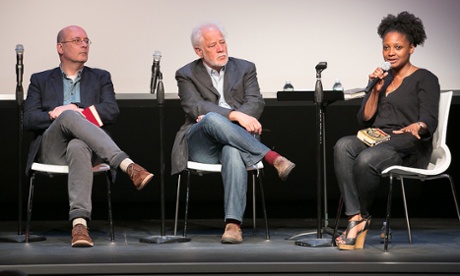
“The only thing I thought I knew how to do was to use an image and then leap away from it,” the Pulitzer Prize-winning poet Tracy K Smith said on Thursday at a panel on memoir held as part of the PEN World Voices Festival, describing the challenge of shifting from poetry to prose. But in writing her own recent memoir Ordinary Light, she came to love the richness of prose: “It felt like the most beautiful work animal you can imagine, bearing all these different loads and moving underneath them.”
Smith introduced her work by reading a passage from Richard Wright’s autobiography Black Boy, in which the author describes his success at school as an assault on the racist Southern educational system. Although Smith had a much happier childhood, her memoir similarly explores the way that race shaped her upbringing.
But she wanted to write her own memoir for reasons more personal than political. The book opens with a description of her mother’s death from cancer, a loss that she had tried many times to write about in the 20 years since it happened. It wasn’t until she was pregnant with her first child that, Smith said, “I felt an urgency. I told myself I wanted [my daughter] to know my family, my parents, whom she would never meet, and I wanted to tell her the story of us.” That initial aim, of sharing what she knew, became instead a process of discovering what she didn’t know. “What I realize now is that I wanted to tell myself that story.”
Smith’s co-panelists, Michael Ondaatje and Luc Sante, have both worked more often in prose. But they shared with Smith the experience of memory’s instability and of surprise at the unexpected revelations it brings when you try to write down what you remember. Sante, author of the 1998 memoir The Factory of Facts, was born in Belgium and emigrated to the United States as a young child. He described returning to his hometown as a young man and experiencing “a massive Proustian orgasm all over the place”. Finding himself in a place that was utterly familiar and entirely strange prompted him to try to write a book “not about me, but about what formed me”.
Like Sante, Ondaatje grew up with the memory of a profound cultural dislocation, moving from Sri Lanka to England as a child before settling in Canada. Best known for his novels and poems, Ondaatje is also the author of the 1982 memoir Running in the Family, which involved a return to the places and people he’d long left behind, and, he discovered, a world of unreliable narrators. “Everyone I talked to was telling me these fantastic stories which were mostly lies,” he recalled. But in the midst of a good story, the listener has to trust and believe the storyteller – there is no time to check the facts. So the process became, Ondaatje said, a “Herodotus act” of recording everything, truth or fiction.
Among the fantastic storytellers, of course, were family members, who didn’t always come to see things the same way these writers did. Each could remember moments when memories clashed. “My mother, who was not a reader, would open it sporadically two pages at a time and end up screaming: ‘He died in 1925, not 1929!’” Sante recalled. “I never heard the end of it.” For Smith, factual uncertainty turned out to be revealing: when she checked the details of her mother’s illness with her siblings, she discovered that “we had been told different stories”.
Part of the enduring appeal of memoir may be that it reminds us that our identities are built on shared stories about “who we are, where we came from, what we believe”, said the novelist AM Homes, who moderated the panel. It’s only when someone in the family rejects the story – “the aunt no one speaks to any more” – that we learn that it is something that can be shaped, invented, contested. For Ondaatje, the line between fact and fiction in his own writing has blurred so far that his novel The Cat’s Table, which tells the story of a young Sri Lankan boy traveling to England in the early 1950s, now seems to him almost like another memoir.
“I thought writing was saying what you knew,” said Smith. It was through becoming a poet that she learned that “it’s really about asking questions” – a realisation that allowed her the freedom to imagine the past experiences of her mother. Sante agreed that it was the process of writing memories down that revealed the past in new shapes. “All your life you’ve had these myths in your head,” he said, “and the truth lies elsewhere.”

